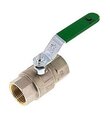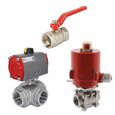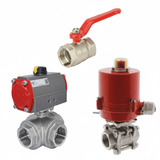Water Ball Valves
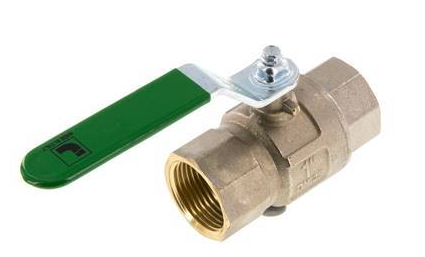
Figure 1: Manual water ball valve with a handle
Water ball valves offer on/off control of water flow with a simple 90-degree turn of the handle. Ball valves control water flow in various applications due to their simple operation, durability, and effective sealing capabilities. Here are some common water ball valve applications:
- Residential plumbing: They are used as shut-off valves under sinks, toilets, and at the main water line entry to homes, providing reliable and easy flow control.
- Garden irrigation systems: Ball valves control water flow to different zones, allowing for efficient management of garden watering systems.
- Commercial and industrial water systems: In these settings, ball valves regulate water flow in cooling systems, control processes in water treatment plants, and manage distribution in various industrial applications.
- Municipal water supply: They are used in distribution networks to isolate sections for maintenance and to help regulate water pressure throughout the system.
- Fire protection systems: Ball valves are employed to control water flow to sprinkler systems, ensuring quick and effective response in case of a fire.
View our online selection of ball valves!
Water ball valve features
A quarter-turn ball valve is ideal for isolating water flow in a system. Ball valves are used in general-purpose and industrial water applications for many reasons:
- Superior sealing: Ball valves offer excellent sealing, maintaining water quality and preventing waste.
- Bidirectional flow: They allow water to flow in both directions. This simplifies system design by reducing the need for additional valves and complex piping.
- Lightweight and easy installation: Their lightweight construction makes them easy to install and maintain, even in tight spaces. This reduces labor costs and downtime in water infrastructure projects. Special versions like mini ball valves are even more compact and specially designed for extremely tight spaces, such as under sinks or in crowded mechanical rooms.
- Clear status indication: The handle position provides a straightforward visual cue of the valve's status (open or closed).
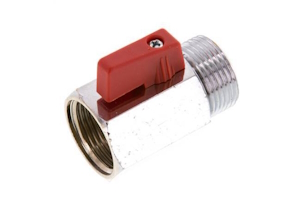
Figure 2: A male to female mini ball valve
Selection criteria
This section covers the most crucial selection criteria for water ball valves. Read our ball valve selection guide for more comprehensive information on the various parameters to consider while selecting a ball valve for an application.
1) Housing materials
The material selection for the water ball valve's housing is crucial to prevent corrosion and ensure longevity. Always ensure the chosen material is compatible with the media in use. Common materials include:
-
Brass: Brass is the most popular choice for water ball valve housings in everyday water lines. However, brass is not suitable for use with salt water or distilled water due to the risk of dezincification. Brass is commonly used in residential and industrial applications due to multiple reasons:
- Brass is durable and corrosion-resistant, making it ideal for potable water applications and general water lines.
- Brass ball valves are more resistant to contaminated media than other housing materials and provide reliable sealing even with dirty media.
- They can withstand high pressure, high temperatures, and high flow rates.
- They are economical due to their simple, robust design and minimal maintenance requirements.
- Stainless steel: Stainless steel provides superior corrosion resistance and is suitable for high-pressure applications and aggressive media. In applications where water may contain particulates, it is advisable to install a filter upstream of the ball valve to prevent clogging and ensure reliable operation. However, stainless steel can be costly.
- Plastic: Plastic variants like PVC and polypropylene are cost-effective, lightweight, and resistant to various chemicals. Plastic ball valves are often used in irrigation systems to control water flow and isolate parts of the system during maintenance.
2) Seal materials
Considerations for selection:
- Potable water: EPDM and Teflon are both suitable for potable water applications, with EPDM being more cost-effective.
- Temperature and pressure: Ensure the selected material can withstand the specific temperature and pressure conditions of your system.
- Chemical exposure: For applications with significant chemical exposure, Teflon/FKM is recommended due to its excellent chemical resistance.
The general properties of the common seal materials are:
-
EPDM (Ethylene Propylene Diene Monomer):
- Ideal use: EPDM is the preferred choice for general water applications, especially potable water systems, as it does not impart any taste to the water.
- Temperature range: Operates effectively from 0 𐩑C to 100 𐩑C (32 𐩑F to 212 𐩑F).
- Pressure rating: Suitable for pressures up to 10 bar (145 psi).
- Advantages: Excellent resistance to water, steam, and a wide range of chemicals, making it versatile for many water-related applications.
-
FKM (Fluoroelastomer):
- Ideal use: Suitable for water applications with high chemical exposure and elevated temperatures, often used in industrial systems.
- Temperature range: Up to 60 𐩑C (140 𐩑F).
- Pressure rating: Suitable for pressures up to 16 bar (232 psi).
- Advantages: Excellent chemical resistance, temperature stability, and durability. Ideal for harsh environments but generally more expensive than other options.
-
Teflon (PTFE - Polytetrafluoroethylene):
- Ideal use: Teflon is an excellent choice for water applications requiring high chemical resistance and temperature stability, including potable water systems.
- Temperature range: Operates within a broad range from -20 𐩑C to 200 𐩑C (-4 𐩑F to 392 𐩑F).
- Pressure rating: Suitable for pressures up to 50 bar (725 psi).
- Advantages: Provides superior chemical resistance and can handle extreme temperatures. However, it is generally more expensive than other seal materials.
3) Certifications and compliance
For potable water applications, compliance with regional safety standards is mandatory to ensure water safety and prevent contamination. Key certifications include:
- NSF certification: Required in the United States for valves used in drinking water systems.
- KIWA Water Mark: Necessary in the Netherlands and the EU for potable water applications.
- WRAS (Water Regulations Advisory Scheme) certification: Required in the United Kingdom to ensure compliance with water safety standards.
Additionally, consider selecting an anti-legionella ball valve, which allows for the drainage of trapped water to prevent bacterial growth. Read our article on ball valves for drinking water for more information on ball valves suitable for use with drinking water.
4) Flow control needs
2-way valves are ideal for simple on/off control, while 3-way valves, available in T-port or L-port designs, are suited for diverting or mixing flows.
5) Automation and control
Ball valves can be manually operated or automated using electric or pneumatic actuators.
-
Manual: Manual ball valves are operated using a handle or handwheel.
- Rotating the handle by 90 degrees will either open or close the valve. When the handle is perpendicular to the pipe, the valve is closed.
- Rotating the hand wheel (Figure 3 left) 360 degrees will open or close the valve. The hand wheel is marked with a scale that allows it to replicate the desired flow rate.
- Electric/pneumatic actuation: Use ball valves with ISO-Top flange (ISO 5211) for attaching to electric or pneumatic actuators. ISO 5211 standardizes flange patterns and drive shaft sizes, enabling actuators to attach to valves without custom adapters. This standardization ensures compatibility between valves and various actuators, simplifying valve automation.
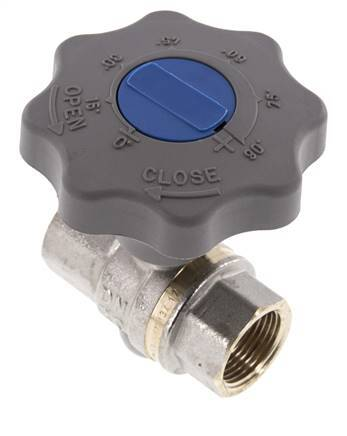
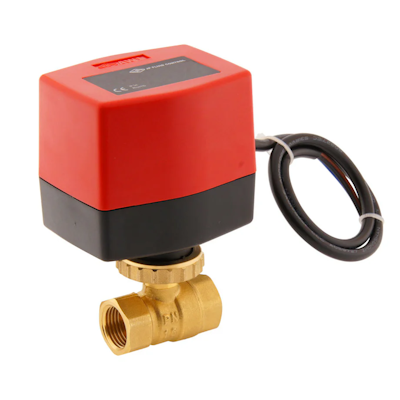
Figure 3: Water ball valves with handwheel (left) and electric (right) actuation
Manual vs automated ball valves
- Manually operated ball valves are commonly used in residential and commercial plumbing systems for shut-off applications under sinks and toilets and in garden irrigation systems to manually control water flow to different zones. They are used for basic flow control in non-critical water lines where adjustments are infrequent.
- Automated industrial applications utilize ball valves that are actuated electrically or pneumatically. They are used in applications where precise control, frequent adjustments, or remote operation are required. They are commonly found in industrial water treatment plants, municipal water distribution networks, and automated process systems. For example, an electric ball valve with a timer can be used to adjust and automate the time interval during which the valve remains open and closed.
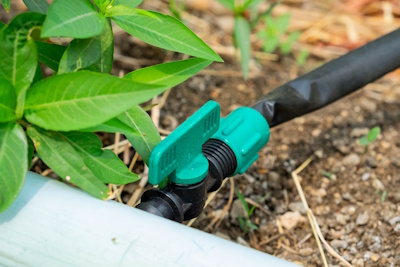
Figure 4: PVC ball valve for watering systems
FAQs
What is the function of a ball valve in a water tank?
A ball valve in a water tank regulates water flow. It provides precise control, is durable, and ensures efficient water management by easily opening or closing the flow.
What does a water heater ball valve do?
A water heater ball valve controls water flow, allowing quick shut-off and regulation with a 90-degree turn, ensuring efficient and safe operation.
How do you operate a ball valve on a water heater?
To operate, turn the handle 90 degrees. Aligning it with the pipe opens the valve, while turning it perpendicular closes it, stopping water flow.




